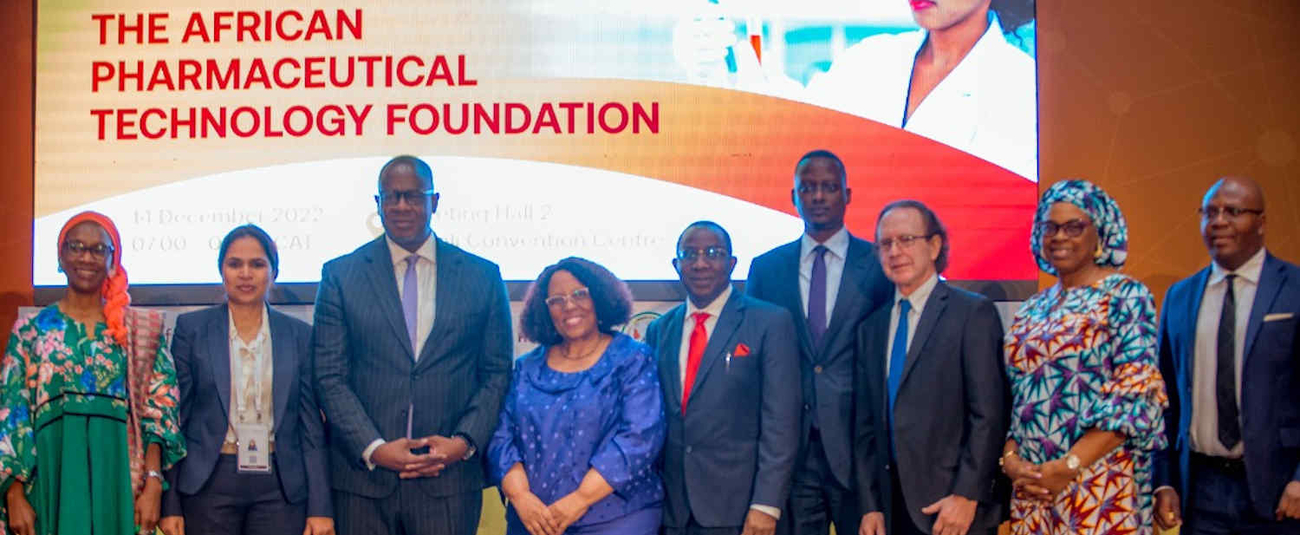The African Development Bank Group has officially inaugurated its latest initiative, the African Pharmaceutical Technology Foundation (APTF).
The AfDB launched the foundation at the Bank’s 2nd International Conference on Public Health in Africa, with the theme: “Technology Access for Pharmaceutical Manufacturing: The African Pharmaceutical Technology Foundation.” The inauguration was part of the conference held in Kigali, Rwanda, on 14 December.
The APTF will partner with the African Union to enhance Africa’s capacity to develop drugs, diagnostics, vaccines and therapeutics along the value chain to help build its pharmaceutical sector.
During the African Union Summit in Addis Ababa in February 2022, African leaders called on the African Development Bank to facilitate the creation of the African Pharmaceutical Technology Foundation. Months later, AfDB’s Board of Directors approved the foundation’s establishment.
According to the Bank via its official website on 22 December, Africa annually imports no less than 70% of the medicines it requires at the cost of $14 billion. Changing the game to enable African countries to develop their capacity to manufacture pharmaceutical products has public health, strategic and economic rationales.
“This new initiative comes as a solution, since most [African] countries still face challenges in receiving [medicines] on time,” Dr. Yvan Butera, Rwandan Minister of State for Health, commented. The Foundation, hosted by the Government of Rwanda in Kigali, is expected to commence operations in early 2023.
During his speech, Vice-President of Private Sector, Infrastructure and Industrialisation at the African Development Bank Group, Solomon Quaynor, said Covid-19 had revealed the flaws in Africa’s healthcare system.
Read also: AfDB Group Approves $50 Million Trade Finance (RPA) with Natixis
“The Covid-19 pandemic has exposed the fragility of global health systems and the gaps in the production of critical drugs on the continent.” He added: “The APTF is a ground-breaking institution that will significantly enhance Africa’s access to technologies that underpin the manufacturing of pharmaceutical products.”

He explained further that the APTF is an innovative organisation that will considerably improve Africa’s access to technology supporting pharmaceutical production.
Growing Africa’s Pharmaceutical Industry through Technology
Prof. Padmashree Gehl Sampath, Special Advisor on Pharmaceuticals and Health Infrastructure to Dr Akinwumi Adesina, President of the African Development Bank Group, introduced the African Pharmaceutical Technology Foundation (APTF) at the event. She emphasised that the Foundation was created to assist African nations in closing the technology gap in sustainable domestic manufacturing.
According to Prof. Sampath, “Pharmaceutical companies in Africa face three specific barriers to technology access: lack of opportunities for horizontal and vertical product diversification, inability to mobilise domestic resources for technological advancement, and access to technology and related know-how for production.
To grow Africa’s pharmaceutical industry, there are a lot of technical risks that need to be covered. For example, African businesses need to stop focusing on one product at a time, which puts them at risk.
Dr. Precious Matsoso, the co-chair of the World Health Organization’s (WHO) International Negotiating Body on Pandemic Prevention, Preparedness, and Response, discussed the significance of technology challenges for pandemic preparedness in the future. “Would provide much-needed support to remove technical barriers to equitable access,” she said of the African Pharmaceutical Technology Foundation.
Dr. Richard Hatchett, CEO of the Coalition for Epidemic Preparedness Effort, highlighted that the initiative “will help in saving lives on the continent” and called the foundation’s creation “timely” given COVID-19’s experience.
The Board of Directors of the African Development Bank approved the Foundation in June 2022. It is expected to make it easier for African countries to get the technology they need to make the full range of pharmaceutical products, with a focus on creating supply chains and giving more people access to different types of building block technologies.
The Foundation will also act as a clear middleman, promoting and brokering the interests of the African pharmaceutical industry on a global scale through licensing and other market-based and non-market mechanisms. This will help improve access to proprietary technologies, know-how, and industrial processes.
The WHO, the Coalition on Epidemic Preparedness, the South Center in Geneva, and the Federal Ministry for Economic Cooperation and Development of Germany have shown keen interest in collaborating with the Foundation in the new year.
Other Discussants’ Submissions
Prof. Carlos Correa, Executive Director of the South Center in Geneva, explained that intellectual property grants monopolies and that these monopolies give property owners the power to regulate the transfer of innovations. On his part, he noted the significance of Africa has its own framework for the growth of its pharmaceutical industry. Developing the tools necessary to speed up technology transfer to Africa is critical.
The panellists stressed the need for collaboration between African pharmaceutical firms and those on other continents, such as Europe.
According to Brigit Pickel, Director General for Africa at the German Federal Ministry for Economic Cooperation and Development, COVID-19 has refocused on enhancing local production of essential medical items. She highlighted that Germany welcomes the creation of the APTF and the crucial role it will play in tackling market and technological development obstacles.
Prof. Fredrick Abbott, an Edward Ball Eminent Scholar at Florida State University in the United States, talked about how important it is to make the pharmaceutical industry work well.
The professor said, “You need a focus on intellectual property management in the broad sense of the word… and on promoting joint ventures such as those that have facilitated the creation of many COVID-19 vaccines.”
